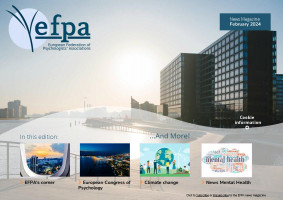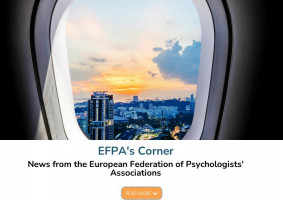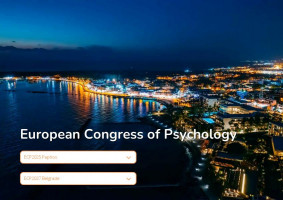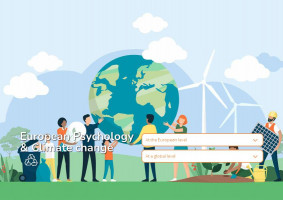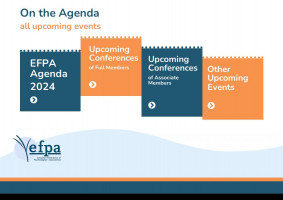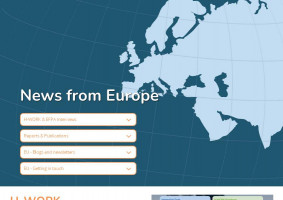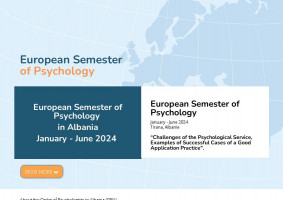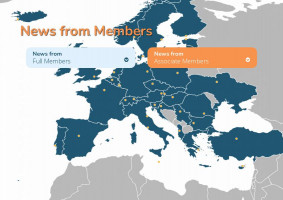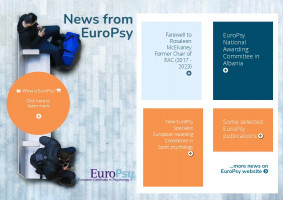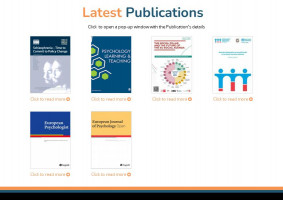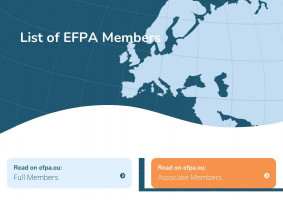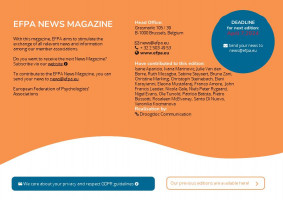What is EuroPsy?
Click here to
learn more
EuroPsy (or European Certificate in Psychology)
is a European standard of education, professional training and competence in psychology set by the European Federation of Psychologists’ Associations (EFPA).
Visit: www.europsy.eu


Farewell to Rosaleen McElvaney
Former Chair of EAC (2017 - 2023)
Fond memories of sitting over breakfast in the Best Western hotel in Brussels, listening to Ingrid Lunt, Robert Roe, Jose Maria Piero and Ype Poortinga chatting about the early days of the EuroPsy.
It was probably the morning of a Chairs meeting, given that Robert was there. Before there was a Head Office in Brussels, they used to meet in different countries, often in each other’s homes; once they met in Mykonos! They would reminisce about the challenges of getting consensus on the various regulations for the EuroPsy. Those conversations really impacted on me in terms of developing an appreciation of what they had achieved; how they brought so many different perspectives together and found a compromise that everyone could live with.
Compromise was something I learned from these colleagues; without it, we wouldn’t have the EuroPsy and we wouldn’t have the support of 37 countries in Europe for this initiative. Most people think their own system of education and training should simply be replicated in other countries, then all would be fine. But psychologists in different countries have put a lot of work into developing their education and training systems in ways that fit with their own legal and policy context. Diversity is what makes Europe such a rich continent; but this diversity brings its own challenges. We have to respect our differences but come to some agreement as to what is acceptable, the minimum standard that is illustrated through the EuroPsy.
When I presented information about the EuroPsy at the Association of State and Provincial Psychology Boards in Salt Lake City in 2019, I commented on the challenges of negotiating consensus when in Europe we all speak different languages. Before that meeting, my assumption was that as they all spoke English, this must make negotiations about psychology standards somewhat easier to manage. However, while listening to their presentations and the challenges they faced, I realised that they too all speak different languages from state to state, from province to province. I had naively thought that a common language would smooth the path towards having standardised regulations, however, psychology is a much more complex field than that!
The European Federation of Student Psychology Associations in Kowary, Poland, also in 2019, stands out as one of the more interesting locations I visited as Chair of the EAC. Student conferences are always inspiring; the enthusiasm in the air, hope for the future and limitless possibilities of what can be achieved. Travelling by train, with no Polish to my name, crossing over platforms and hoping I was on the right train...and being driven out to a remote location near Kowary, I could see why these students choose such remote locations for their conferences. This way they can keep all the delegates together for the duration of the conference. Social events were interspersed with business meetings, one blending into the other; everyone can be located at any one time to be consulted. Itwas fun, and hard work a great combination.
The chill in Poland contrasted with my visit to Madeira in June 2016, at the invitation of the Ordem dos Psicólogos. It was memorable for events outside of the conference the Brexit vote came in that morning and delegates to the conference were stunned; what would the implications be for mainland Europe? I had an interesting exchange with a woman at the bus stop that morning on my way to the conference venue; she was English, living in Madeira and was delighted at the outcome of the referendum. Britain, she said, had been giving far too much money to Europe. It was time they looked after their own. I wonder how that worked out for her..
My highlight for each year was the Chairs meeting. It was an opportunity to meet up with the wider EuroPsy family; all those people who work hard throughout the year and primarily communicated through email, annual reports, NAC approval forms and occasional requests for information or assistance with the latest dilemma. The Chairs meeting was an opportunity to share our experiences.
Everyone in that room had a shared commitment; we were all here for the same reason and we were all committed to making the EuroPsy better. Chairing the meeting was hard work, but it all felt worthwhile as we said goodbye at the end of the day and looked forward to the year ahead when we could work towards our goals.
Fond memories of my work in EFPA would have to include the vote at the General Assembly in Brighton to approve a field of practice and specialist certificate for sports psychology. I had keenly felt the disappointment of those who proposed a new field of practice to previous General Assemblies. For me, EFPA must represent all its member associations. A particular field of practice in one area of psychology may not be in demand in my country, but in a democratic organisation, we must think of our neighbouring country and what psychologists need in that country, if we are to be
able to work together for the future. While I did my bit in supporting the initial proposal, following on from the work of Ingrid (as chair of the EAC) and Michel (as the first chair of the task force), it was the sheer commitment and hard work of the provisional Specialist EAC in sport psychology, ably chaired by Chris, along with support from so many Member Associations, that showed me what can be achieved in EFPA. I left the General Assembly in 2023 feeling positive about the future for the EuroPsy.
Relationships, relationships, relationships. That’s what we are taught is central to our work as psychologists in developing our services, negotiating consensus, and basically getting anything done. That is what I will miss as I leave my role behind as Chair of the EAC and member of that committee since 2010: the people I sat around the table with, thrashing out potential solutions to the various dilemma we were presented with, both on the S-EAC in Psychotherapy and the EAC; the NAC chairs and other representatives from the Member Associations who I had the pleasure to work with; my colleagues on the Board of Directors (BoD) who supported me in my role as Chair, particularly Eleni as my liaison person to the BoD, Nicola and Christoph as vice president and president of EFPA; and most of all, my support team in Head Office – Valerie, Julie, Ruth, and Sabine who all had a wonderful welcome for us when we arrived into the office and my research assistants, Amy and Rachael, based in Dublin. Ivana has been my right hand woman for many years now, and we have enjoyed a wonderful close working relationship to the point where each decision made would be preceded with ‘what would Ivana say?’ The EuroPsy couldn’t be in better hands.
Rosaleen McElvaney
Former EAC Chair 2017 - 2023
EuroPsy National Awarding Committee in Albania
Some selected EuroPsy publications
What is EuroPsy?
Click here to
learn more
What is EuroPsy?
Click here to
learn more
EuroPsy (or European Certificate in Psychology)
is a European standard of education, professional training and competence in psychology set by the European Federation of Psychologists’ Associations (EFPA).
Visit: www.europsy.eu
New EuroPsy Specialist European Awarding Committee in Sport psychology
The EFPA Board of Directors - BoD of EFPA has discussed the nomination for the members to the EuroPsy Specialist European Awarding Committee in Sport psychology (S-EAC Sport Psychology) and is very happy to confirm that the S-EAC Sport Psychology is now composed by:
1.Chris Harwood (UK) - Chair
2.Renata Barić (Croatia)
3.Charlotte Raue-Behlau (Germany)
4.Caterina Gozzoli (Italy)
5.Alejandro García Mas (Spain)
Looking forward to a successful collaboration
EuroPsy team
